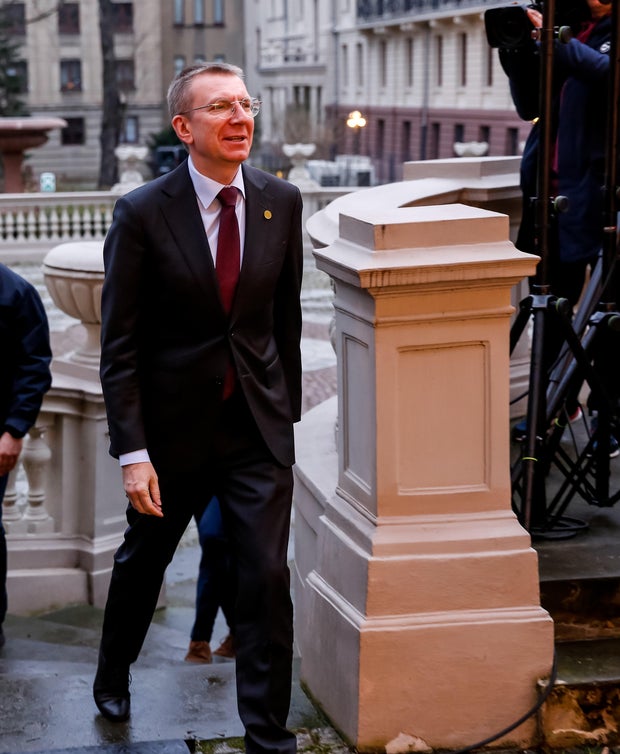[ad_1]
Latvian Foreign Minister Edgars Rinkēvičs has urged the U.S.-led NATO alliance not to “overreact” to President Vladimir Putin’s announcement that Russia will deploy tactical nuclear weapons in Belarus, which shares borders with both Latvia — a NATO member — and Ukraine.
“Let’s face it, Russian nuclear weapons have already been deployed in Kaliningrad, near our borders, even before [Russia’s 2014 invasion of] Crimea started,” Rinkēvičs told CBS News. “I would view this as some kind of bargaining chip. Something to blackmail our societies.”
He said he “would not over-dramatize” this move, but called for additional sanctions against Belarus and Russia. Rinkēvičs said he did not consider Belarus a sovereign state, but rather a “part of a Russian military district.”
Putin said over the weekend that Russia would deploy nuclear weapons in Belarus on fighter jets and Iskander hypersonic missiles, which have a range of around 300 miles.
Dominika Zarzycka/NurPhoto via Getty Images
Rinkēvičs also expressed hopes for an expanded NATO, when the alliance meets in July. He said he’d like to see 32 members at the summit in Lithuania, alluding to Finland and Sweden’s stalled bids to be ratified as the NATO’s newest members.
Finland inched a step closer to NATO membership after the Hungarian parliament ratified the country’s bid Monday. The other member holding out on backing that bid, Turkey, is expected to ratify Finland soon, after Turkish President Recep Tayyip Erdogan said his country would start the process.
Sweden remains blocked because Turkey refuses to back its bid until disputes between the two nations are resolved. Turkey has accused Sweden of harboring members of Kurdish militant groups that Ankara considers terrorists.
Rinkēvičs said he hoped the “allies can resolve outstanding issues so Sweden will also be able to participate.”
He also said that support for Ukraine, as it continues to hold the Russian invasion at bay, has only grown stronger in his country, and he argued that now is not the time for a peace deal. Peace negotiations would only allow Russia “to regroup, to get stronger, and to resume” its assault, said Rinkēvičs.
Secretary of State Antony Blinken warned earlier this week that calls for a ceasefire in Ukraine could be part of a “cynical trap” supported by Russian allies.
As for Russian conscripts trying to avoid being sent to the front lines by seeking refuge in Latvia, Rinkēvičs said Latvia’s door was closed. Latvia and other Baltic states instituted a policy prohibiting fleeing conscripts from entry into the countries because they pose a security risk.
“They are not anti-war people. They are not anti-Putin people. They are not ready to stop the war,” he said, “and in that case, we are not ready to accept them.”
But there continue to be pathways for civilians to enter Latvia from Russia, Rinkēvičs noted.
In December, Latvia canceled the license of the exiled Russian television station TV Rain, after deeming the outlet a national security threat. TV Rain came under criticism after its reporters referred to Russian conscripts as “our military,” and the network showed a map that portrayed Ukraine’s occupied Crimean Peninsula as part of Russia.
Rinkēvičs called the Russian journalists’ remarks “completely unacceptable,” but did not comment further regarding the pending TV Rain litigation.
[ad_2]
Source link
(This article is generated through the syndicated feed sources, Financetin neither support nor own any part of this article)

